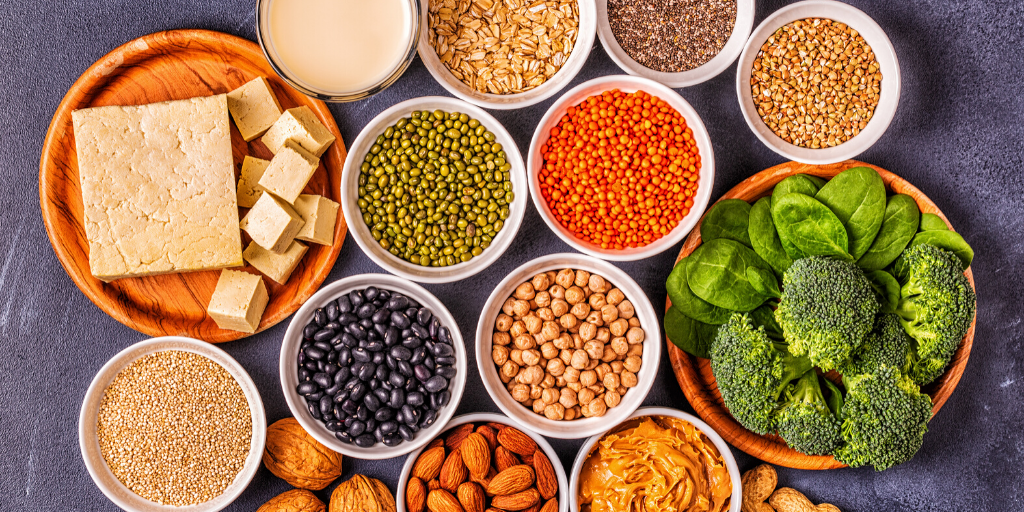As I sit down to write this, I think back to my journey with protein. Growing up, I didn’t really think about its importance. But learning about its benefits changed everything for me.
Protein is key for our cells, helping repair and maintain tissues. It does more than just help muscles grow. It can also boost metabolism, control hunger, and support a strong immune system. Plus, you can find great protein in both animal and plant foods, giving you many choices.
Key Takeaways
- Protein is vital for building and fixing tissues. It also helps with metabolism and weight management.
- You can find high-quality protein in lean meats, fish, dairy, legumes, nuts, and seeds.
- Combining plant and animal proteins gives you all the amino acids you need.
- Spread out your protein intake during the day for the best muscle, weight, and wellness benefits.
- Protein supplements are handy, but whole foods are always the best choice.
The Importance of Protein in a Balanced Diet
Protein is key to a balanced diet, helping build, repair, and maintain body tissues. It’s made up of amino acids, vital for life. Our bodies make some amino acids but need nine essential ones from food.
Protein’s Vital Role in Building and Repairing Tissues
Essential amino acids are crucial for many body functions. They help repair muscles, make enzymes, regulate hormones, and support the immune system. Protein is essential for fixing and growing tissues, keeping our organs and systems working right.
Essential Amino Acids and Their Significance
- The nine essential amino acids are: histidine, isoleucine, leucine, lysine, methionine, phenylalanine, threonine, tryptophan, and valine.
- Our bodies can’t make these amino acids, so we must get them from nutrient-dense proteins in our diet.
- Eating a mix of protein-rich foods, like lean meats, fish, dairy, legumes, and whole grains, ensures we get all the essential amino acids we need.
Knowing how important protein intake and essential amino acids are helps us make better diet choices. This supports our health and well-being.
Key Benefits of Adequate Protein Intake
Protein is key for our health in many ways. It helps build and repair tissues, supports the immune system, and aids in weight control. Adding the right amount of protein to your diet has many benefits.
Muscle Repair and Growth
Protein is vital for fixing and growing muscles, especially after working out. The amino acids in it rebuild and make muscle fibers stronger. This helps with muscle growth and recovery. It’s great for those wanting to boost their muscle gain and fitness.
Weight Management and Satiety
Eating enough protein helps with weight loss and feeling full. Protein-rich foods make you feel more satisfied, cutting down on hunger and cravings. Studies also show that high-protein diets can increase metabolism and help burn fat better.
Improved Immunity and Hormone Regulation
Protein is crucial for a strong immune system. It makes antibodies to fight infections and diseases. It also helps make hormones that control things like immunity and healthy aging.
It’s important to eat a balanced diet with plenty of protein for good health. Knowing the benefits of enough protein helps people make better choices. This supports their fitness goals, weight control, and overall health.
wellhealthorganic Benefits of Protein: From Muscle Strength to Better Aging
Getting enough protein is key for keeping muscle mass and strength, especially as we get older. Protein helps build and repair muscles. This makes our muscles stronger and improves how well our bodies work.
Protein also boosts bone strength. It supports the production of collagen, a vital part of bones. This increases bone density and lowers the chance of breaking bones. This is very important as we age to keep us moving easily and safely.
Plus, energy levels get a boost from enough protein. It gives us the building blocks for enzymes and hormones that manage energy. This helps fight tiredness and keeps us feeling alive and active.
A diet full of high-quality protein is great for better aging. It keeps muscles strong, bones healthy, and energy up. This helps us stay physically fit and independent as we get older.
| Protein-Rich Food | Protein Content (per 100g) |
|---|---|
| Soybeans | 36g |
| Red Lentils | 26g |
| Mung Beans | 24g |
| Chickpeas | 19g |
| Pumpkin Seeds | 30g |
| Chia Seeds | 17g |
| Tofu | 17g |
| Greek Yogurt | 20g per cup |
| Whole Eggs | 6.24g per large egg |
“Adequate protein intake is essential for building and maintaining muscle mass, which is crucial for overall health and physical function as we age.”
Adding a mix of high-quality protein sources to your meals helps you get the best muscle strength, bone strength, energy levels, and better aging.
Recommended Daily Protein Intake
It’s important to know how much protein you need every day. The Recommended Dietary Allowance (RDA) says you should get 0.8 grams of protein per kilogram of body weight. But, this might not be enough for everyone. This includes active people or those with health issues.
General Guidelines for Protein Needs
How much protein you need depends on your age, gender, and how active you are. Most healthy adults should aim for 25-35% of their daily calories to come from protein. This means about 150 grams of protein on a 2,000-calorie diet.
Increased Requirements for Active Individuals
If you’re into sports or exercise a lot, you might need more protein. Athletes or those who work out often could need 1.2 to 2.0 grams of protein per kilogram of body weight. This helps with muscle repair, growth, and recovery. Eating foods high in protein like lean meats, fish, eggs, and plants can help you get what you need.
| Activity Level | Protein Intake (g/kg body weight) |
|---|---|
| Sedentary | 0.8-1.0 |
| Moderately Active | 1.0-1.6 |
| Highly Active | 1.2-2.0 |
Knowing how much protein you need and eating a variety of high-quality protein foods is key. It supports your health, whether you’re active or just want to eat well.
Animal-Based Protein Sources
Animal-based foods like lean meats, fish, dairy, and eggs are full of protein. They have all the amino acids our bodies need. These foods help repair and build tissues, grow muscles, and keep us healthy.
Lean Meats and Fish
Lean meats such as chicken, turkey, and certain beef and pork cuts are packed with lean protein. A 3-ounce piece of chicken breast has about 26.5 grams of protein. Fish like salmon, tuna, and tilapia are also full of lean protein. A 3-ounce salmon serving has 22.5 grams of protein.
Dairy Products and Eggs
Dairy products like milk, cheese, and Greek yogurt are excellent for complete proteins. A cup of skim milk has 8.5 grams of protein. Cottage cheese or plain Greek yogurt can give you 13 grams or more. Eggs are a great protein-rich choice, with one large egg offering 6 to 8 grams of complete protein.
“Incorporating a variety of animal-based protein sources into your diet can help you meet your daily protein needs and support overall health and well-being.”
Plant-Based Protein Options
For those on a vegetarian or vegan diet, plant-based proteins are key. They are packed with nutrients and can be used in many ways. Legumes, nuts, seeds, and soy-based proteins are great for getting the amino acids your body needs.
Legumes: A Versatile Protein Powerhouse
Legumes like lentils, chickpeas, and black beans are full of plant-based protein. They also have lots of fiber, complex carbs, and important vitamins and minerals. Adding legumes to your meals helps with muscle repair and boosts overall health.
Nuts, Seeds, and Whole Grains
Nuts and seeds, such as almonds and chia seeds, are great for protein. They have healthy fats, fiber, and minerals. Whole grains like quinoa and oats add to your protein intake, making them a great choice for a balanced diet.
Soy-Based Proteins: Tofu, Tempeh, and Edamame
Soy-based proteins like tofu, tempeh, and edamame are known for their high-quality protein. These ingredients can be used in many dishes, from stir-fries to smoothies. They make a nutritious addition to a plant-based diet.
| Protein Source | Protein Content per 100g |
|---|---|
| Quinoa (cooked) | 4.38g |
| Oats (raw) | 13.2g |
| Seitan (fried) | 11.28g |
| Spirulina (raw) | 57.5g |
| Lentils (boiled) | 9.02g |
| Chickpeas (boiled) | 14.5g |
| Peanuts (raw) | 25.8g |
| Soybeans (raw) | 12.95g |
| Chia seeds (raw) | 18.29g |
| Almonds (raw) | 20.33g |
| Hemp seeds (raw) | 31.56g |
Adding a variety of plant-based proteins to your diet helps meet your protein needs. It also brings many health benefits.
Incorporating Protein into Your Diet
Getting enough protein is key for good health. To do this, focus on planning your meals and choosing smart snacks. Include different protein sources to get all the essential amino acids and nutrients you need.
Meal Planning and Smart Snacking
When planning meals, add a high-quality protein source like lean meats, dairy, or plant-based foods. This helps meet your protein needs and supports muscle repair, weight control, and overall health.
Don’t forget to add protein-rich snacks to your day. Options like Greek yogurt, hard-boiled eggs, nut butters, or protein smoothies are great. They give you a nutritious boost and keep you feeling full longer.
Varying Protein Sources for Optimal Nutrition
- Include a mix of protein-rich foods in your diet, like poultry, fish, eggs, dairy, legumes, and whole grains.
- This mix ensures you get a broad range of amino acids and essential nutrients for health and wellness.
- Combining plant-based proteins with animal-based proteins, like lentils with chicken or tofu with eggs, makes for a more complete protein.
| Protein Source | Protein Content per Serving |
|---|---|
| Chicken breast (3.5 oz) | 31g |
| Salmon (3.5 oz) | 22g |
| Eggs (1 large) | 6g |
| Lentils (1 cup cooked) | 18g |
| Peanut butter (2 tbsp) | 7g |
By using a mix of protein sources in your meals and snacks, you make sure you get the best nutrition for your body.
Protein Supplements: When and Why
If you need more protein or find it hard to get enough from food, protein powder supplements or other protein supplements might help. These dietary supplements can make sure you get enough protein. This is especially true for people who are active or have certain dietary needs.
Studies show that more protein can be good for you. It helps with muscle repair and growth, aids in weight control, and boosts immune function and hormone balance. For example, eating 35% of your calories as protein, spread out over six meals a day, can reduce body fat and belly fat.
Whey protein and plant-based options like pea, hemp, or pumpkin seed protein are great for boosting your protein. They’re good if you’re active or trying to build muscle.
“Consuming protein with carbohydrates can minimize blood sugar and insulin spikes, thus supporting weight loss efforts.”
Remember, protein supplements shouldn’t replace a healthy diet. Try to get most of your protein from foods like lean meats, fish, dairy, eggs, beans, nuts, and seeds. Supplements can be a handy way to add extra protein when you need it.
Figuring out how much protein you need depends on your activity level, goals, and health. Sedentary adults need about 0.8 grams of protein per kilogram of body weight, or 15-20% of your daily calories. But, if you’re active or want to build muscle, you might need 1.2 to 1.5 grams per kilogram of body weight.
By mixing whole foods and protein supplements, you can support your health, fitness, and weight goals.
Addressing Common Protein Myths and Misconceptions
Protein is a hot topic in nutrition, sparking lots of debate. It’s key for health and well-being, but many myths surround it. Let’s clear up some common misconceptions.
One myth says high-protein diets are bad for the kidneys. But studies show healthy people can eat more protein without kidney problems. Protein helps with muscle, immune function, and overall health.
Another myth claims protein from animals harms bones. But research shows high-quality protein foods, like dairy, are good for bones. Protein and exercise are key for strong bones.
- Myth: High-protein diets are harmful to the kidneys.
- Myth: Protein from animal sources is detrimental to bone health.
- Myth: Protein deficiency is a widespread problem in developed countries.
- Myth: Vegetarians and vegans are at a higher risk of protein deficiency.
Some think protein shortage is common in developed countries. But it’s mostly seen in poorer nations or those facing food issues. In the West, most people get enough protein, except for some groups like the elderly or those on strict diets.
Some also worry vegetarians and vegans might not get enough protein. While true that animal proteins are complete, plant-based diets can also offer plenty of protein. Foods like legumes, nuts, seeds, and grains are great sources.
By understanding and debunking these myths, we can make better food choices. This ensures we get enough protein for our needs, no matter our diet or lifestyle.
Protein for Specific Needs: Athletes, Seniors, and Weight Loss
Protein needs change with age, activity level, and health goals. Athletes need more protein to fix and grow muscles. Older adults need it to keep muscle mass and strength. For those trying to lose weight, a high-protein diet helps with feeling full, boosts metabolism, and keeps muscle.
Protein for Athletes
Athletes who work out a lot need more protein than those who don’t. This protein helps fix and grow muscles, making them perform better and recover faster. Whey protein isolate is a top choice for athletes because it’s high in protein and easy to add to their meals.
Protein for Seniors
As we get older, our bodies don’t use protein as well. Seniors lose muscle mass and strength, a condition called sarcopenia. To fight this, older adults should eat a lot of high-quality protein. Good sources include lean meats, fish, dairy, and plant-based options like beans, nuts, and soy products.
Protein for Weight Loss
Eating a lot of protein can help with weight loss. Protein makes you feel full, which can lead to eating less and managing weight better. It also helps keep muscle mass while losing weight, keeping your metabolism healthy.
| Product | Price | Whey Protein Content |
|---|---|---|
| Whey Protein Isolate Choco 1kg | Rs 2,999/- | 80% |
| Whey Protein Isolate Choco 3kg | Rs 6,999/- | 80% |
If you’re an athlete, a senior, or trying to lose weight, the right protein can make a big difference. Knowing your protein needs and picking the best options can boost your health and happiness.
Conclusion
Getting enough wellhealthorganic benefits of protein from different protein sources is key for a balanced diet. It helps with muscle repair, weight control, and boosts your immune system. Protein is vital for your overall health and well-being.
Knowing how important protein is and picking the right protein sources can improve your healthy eating. Whether you choose animal or plant-based protein, a varied diet is good for you. It helps with muscle building or keeping a healthy weight.
Adding high-quality wellhealthorganic benefits of protein to your diet can prevent weight gain and fill nutrient gaps. This can improve your health and happiness. By choosing wisely and focusing on a balanced diet, you can make the most of protein for your health and fitness goals.
FAQ
Q: What is the role of protein in the body?
A: Protein is key for building, fixing, and keeping tissues in the body. It’s made of amino acids, which are life’s building blocks. Protein helps with muscle repair and growth, making enzymes, controlling hormones, and more.
Q: What are essential amino acids and why are they important?
A: Essential amino acids are 9 out of 20 amino acids our bodies can’t make on their own. We need to get them from food. They’re vital for muscle repair, making enzymes, controlling hormones, and keeping the immune system strong.
Q: What are the key benefits of adequate protein intake?
A: Protein is key for fixing and growing muscles, especially after working out. It helps with weight control and feeling full. It also keeps the immune system strong and helps regulate hormones in the body.
Q: How does protein impact muscle health and strength?
A: Protein is crucial for keeping muscles strong and big, especially as we get older. It makes bones denser, lowering the chance of breaks. It also boosts energy and helps with healthy aging by keeping muscles strong.
Q: What are the recommended daily protein requirements?
A: The daily protein need is 0.8 grams per kilogram of body weight, says the Recommended Dietary Allowance (RDA). But this might not be enough for athletes, older people, or those recovering from illness. Athletes might need 1.2-2.0 grams per kilogram of body weight.
Q: What are the best sources of protein?
A: Lean meats, fish, dairy, and eggs are great protein sources because they have all the essential amino acids. For vegetarians or vegans, legumes, nuts, seeds, and soy products are good choices.
Q: How can I ensure I’m getting enough protein in my diet?
A: Plan your meals with high-quality protein sources like lean meats, dairy, or plant-based options. Snack on Greek yogurt, nuts, or protein smoothies. Mixing up your protein sources gets you more amino acids and nutrients.
Q: When should I consider using protein supplements?
A: Use protein powders or supplements if you need more protein or can’t get enough from food. They’re good for people with active lives or special diets.
Q: Are there any myths or misconceptions about protein?
A: Yes, people think high-protein diets harm the kidneys or that animal protein is bad for bones. But studies show that enough protein is good for health, from animal and plant sources.
Q: How do protein requirements vary for different individuals and goals?
A: Protein needs change with age, activity level, and health goals. Athletes need more for muscle repair and growth. Older adults need more to keep muscles strong. A high-protein diet helps with weight loss by making you feel full and keeping muscle.












